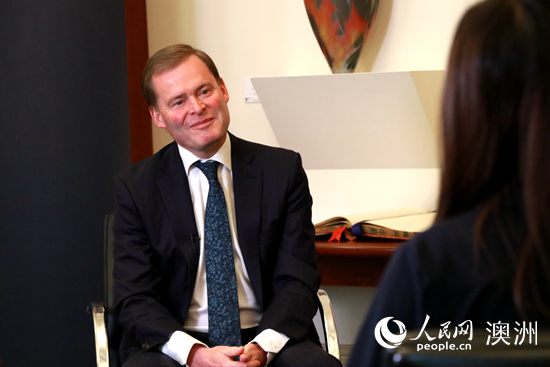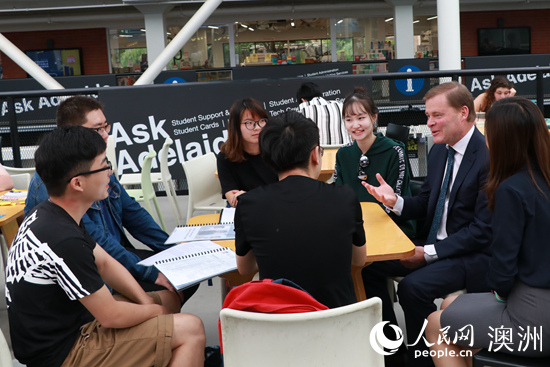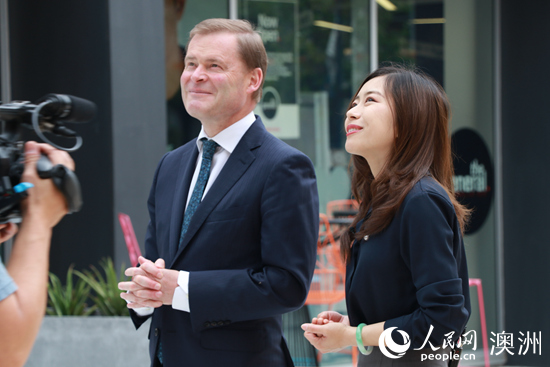

Located in South Australia, the University of Adelaide is known as “the cradle of Australian Nobel Prize winners.” Since its foundation in 1874, it has produced five Nobel Prize winners from different disciplines, accounting for one-third of all Nobel Prize winners in Australia.
“I think there is a spirit of innovation that Adelaide has always fostered, and that is what you need to get a Nobel Prize,” Professor Peter Rathjen, the Vice-Chancellor and President of the University of Adelaide, said proudly.

Professor Peter Rathjen,the Vice-Chancellor and President of the University of Adelaide in the interview (People's Daily Online Lansudan Luo)
Graduating from the University of Adelaide, Professor Rathjen went to the University of Oxford after receiving a Rhodes scholarship. After he finished his Ph.D. degree, he returned to work at the University of Adelaide for 16 years. Before working as the Vice Chancellor of the University of Adelaide, Professor Rathjen worked at the University of Melbourne and the University of Tasmania. Back at this familiar campus, he says he feels like he has come home.
“My father came to the University of Adelaide to get a degree in Agricultural Science and spent fifty years working at the University of Adelaide. So a lot of my childhood was spent in the agricultural faculty,” he said.
“My four brothers and sisters all came to the University of Adelaide, and all studied Biology. We went around my parents’ house on Wednesday evenings for dinner, that wasn’t really a dinner, it was more like a conference. All of those links are here in this university, and for me, that makes it very special. It makes me particularly passionate about what it is that the University of Adelaide can do for the state of South Australia.”
The University of Adelaide has produced five Nobel Prize winners, one-third of Australia's total. Professor Rathjen said he's proud of that statistic. “Amongst them is the man who is commonly voted the most important human being of the twentieth century. That was Howard Florey, who discovered penicillin and thus helped to create antibiotics. His research is thought to have saved about two hundred million lives so far. It's an extraordinary contribution that he made to the world and that we made to the world because he went to medical school here at the University of Adelaide before he went to Oxford University.”

Professor Peter Rathjen talks with international students from China (People's Daily Online Lansudan Luo)
“South Australia was always a state that was interested in education. It was always a state that was prepared to take a risk. Adelaide University was the second university in the world and the first university in Australia to admit women to study. We've got a record of innovation in all areas.”
The University of Adelaide has a long history and rich academic achievements, but also attaches great importance to international exchanges. Professor Rathjen believes that the exchange of international students is an excellent way to connect countries and enhance mutual understanding. “We must all learn how to get on and how to interact with each other, and the best way to do that is by studying together. We respect different cultures, different values, and different ethnicities. International student exchange is one way that Australian students can learn about the rest of the world.”
Currently, the University has about 8,000 international students, among which 4,000 are Chinese students. “We would like to increase that number. We've got scholarships out there to help international students to come to us by shouldering some of the cost,” Professor Rathjen said. “Apart from attracting Chinese students, the University of Adelaide has been working closely with Chinese universities like Tsinghua University and Shanghai Jiao Tong University. Professor Rathjen hopes that the University of Adelaide can develop a stronger and more stable partnership with universities and research institutions in China.
Professor Rathjen first came to China in 2011, and its culture left a deep impression on him, leading him to visit many times. “I love China, and I love Chinese people. I love everything about the country. It's been fascinating to watch China grow, as there has been so much investment in infrastructure. We can see the growth of your universities, and China is becoming a very cosmopolitan place. That's been quite a surprise because that's happened very quickly.”
During Christmas in 2017, Professor Rathjen and his family traveled to Western China for an in-depth tour of Chinese culture and history along the ancient Chinese Silk Road. “I'm very interested in history and culture. The Silk Road is where so much human history has been written. We started at Xi’an, and we went to Dunhuang, Urumchi, Turpan, Kashgar, around the western part of China. Along the entire route, we learned about Buddhism, trading, the history of China and how it has coped with western provinces.”

Professor Peter Rathjen introduces the university to People's Daily Online(People's Daily Online Lansudan Luo)
In recent years, education and scientific research in China have also developed rapidly, and Professor Rathjen hopes to see an increase in Western exchanges with China. “China has gone from being almost invisible in scientific research to last year being publishing the most publications of any country in the world and increasingly improving the quality of its publications. Many great Chinese researchers are also doing great research in Australian, American and British institutions,” he said, adding that at the same time, the world has seen the rise of great Chinese institutions. "China used to have very few universities in the world's top five hundred. Now, China has universities in the top hundred. That’s because China continues to invest in them.”
The ancient Silk Road promoted transportation, trade and cultural exchanges between ancient China and foreign countries. Now, the Belt and Road Initiative has opened a new chapter for China. “China is reconnecting through those ancient trade routes and engaging with the world. Now in China, you see real confidence, and it's based on the fact that you're making progress economically. You're making progress with education, and you're making progress with trade. I've seen Chinese people now standing with confidence on the world stage, as equals, as they should. It's the emergence of a nation that has great pride in the past, but great confidence in where it's going to go in the future.” (People’s Daily Online/ Lansudan Luo)

 Award-winning photos show poverty reduction achievements in NE China's Jilin province
Award-winning photos show poverty reduction achievements in NE China's Jilin province People dance to greet advent of New Year in Ameiqituo Town, Guizhou
People dance to greet advent of New Year in Ameiqituo Town, Guizhou Fire brigade in Shanghai holds group wedding
Fire brigade in Shanghai holds group wedding Tourists enjoy ice sculptures in Datan Town, north China
Tourists enjoy ice sculptures in Datan Town, north China Sunset scenery of Dayan Pagoda in Xi'an
Sunset scenery of Dayan Pagoda in Xi'an Tourists have fun at scenic spot in Nanlong Town, NW China
Tourists have fun at scenic spot in Nanlong Town, NW China Harbin attracts tourists by making best use of ice in winter
Harbin attracts tourists by making best use of ice in winter In pics: FIS Alpine Ski Women's World Cup Slalom
In pics: FIS Alpine Ski Women's World Cup Slalom Black-necked cranes rest at reservoir in Lhunzhub County, Lhasa
Black-necked cranes rest at reservoir in Lhunzhub County, Lhasa China's FAST telescope will be available to foreign scientists in April
China's FAST telescope will be available to foreign scientists in April